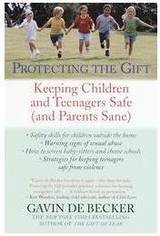Okay, I know that maybe all my attempts to help kids haven’t always worked out well, so this time I thought I’d go to an actual expert to share some tips.
 Out of all the toys, knickknacks and gifts I got as a new parent, there was probably none that was better than the book Protecting the Gift by Gavin de Becker. I can’t recommend it highly enough as it gives sane, practical advice for every parent. Actually, I’ve recommended it so much and loaned my copy to so many people that I don’t have it on my bookshelf anymore. Oopsie!
Out of all the toys, knickknacks and gifts I got as a new parent, there was probably none that was better than the book Protecting the Gift by Gavin de Becker. I can’t recommend it highly enough as it gives sane, practical advice for every parent. Actually, I’ve recommended it so much and loaned my copy to so many people that I don’t have it on my bookshelf anymore. Oopsie!
I know I got a lot out of the book, and I’m reassured by the dozens of five-star reviews from people who seem to have gotten the same confidence that I got from the book.
Anyway, if you’re not already familiar with de Becker or the book, here’s the official summary:
All parents face the same challenges when it comes to their children’s safety: whom to trust, whom to distrust, what to believe, what to doubt, what to fear, and what not to fear. In this empowering book, Gavin de Becker, the nation’s leading expert on predicting violent behavior and author of the monumental bestseller The Gift of Fear, offers practical new steps to enhance children’s safety at every age level, giving you the tools you need to allow your kids freedom without losing sleep yourself. With daring and compassion, he shatters the widely held myths about danger and safety and helps parents find some certainty about life’s highest-stakes questions.
I also suggest visiting de Becker’s site as there’s lot of great advice for just dealing with life.
Okay, I know this all sounds like some sort of cult or infomercial, but I really felt better after reading de Becker’s stuff, and genuinely thought he helped make me and my wife better parents.
In fact, here are
Five Great Parenting Tips from Gavin de Becker
1. Teach children that if they are ever lost, find a woman, preferably one with other kids. Why? From the book: “First, if your child selects a woman, it’s highly unlikely that the woman will be a predator; a woman is likely to stop whatever she is doing, commit to that child, and not rest until the child is safe.”
He points out how most men, although meaning well, are more likely to give a lost child directions to find help rather than actually get involved with them, while a woman—politically correct to say or not—has natural motherly instincts that prevent her from just walking away from a lost child.
He also talks about how we people tell their kids to find a police officer, which he points out is pretty much sheer folly nowadays, as cops are no longer walking a beat around a neighborhood. As he says, “Teaching this to a young child ignores several facts: All identifying credentials, insignias, badges and nameplates are above the waist, but a young child sees a world of legs. In fact, many children get lost in the first place because of following legs (the wrong set): Legs aren’t that distinctive when viewed from two and a half feet off the ground.”
Fortunately so far, we haven’t ever lost our kids, but we make sure to remind them on a regular basis that if we ever get separated, they need to find a woman to help them.
2. Teaching a kid to *NOT* talk to strangers is a BAD rule. First off, he says kids see parents breaking this rule constantly, talking to strangers at the grocery store, at the bank, in restaurants, at libraries, in museums and pretty much everywhere else. And when kids see parents continually breaking their own rule, it sends a terrible mixed message.
He also points out that the idea behind this is the notion that children are constantly abducted by strangers; he then shows that the truth is that more than 90 percent of all child abductions and abuses are perpetrated by people who the child knows, not random candy-proffering freaks in rape vans.
de Becker has a great plan for teaching kids from when they’re toddlers the proper way to approach strangers and how to talk to them, ultimately helping them nurture their own ability to determine who can be trusted and who should avoided.
3. Trust your instincts. A big part of his philosophy talks about how many times people will instinctively recognize that something is wrong or a bad situation is about to happen, but chose to override those instincts.
He makes a great comparison to a doe at a pond with its fawns; if it suddenly senses something is wrong and runs, no human would bat an eyelash, simply chalking it up to “Oh well, its instincts told it there was danger near.”
Yet humans are animals, too, and thus have the same sort of instincts available to them, and constantly let our “rational” minds overrule our instincts. In short, we don’t listen to the “fight-or-flight” instinct that we all have, and tell ourselves things like, “Well, he’s a friend, so he couldn’t possibly be molesting my child,” when, again, the truth of the matter is that the majority of kids who are molested are molested by someone they know.
4. If someone is overly interested in your children or is being overly nice, be aware. Think about it—if someone is trying too hard to be too friendly to your kids, chances are it’s to overcompensate for the creep vibe that they are sending out and that your instincts might be picking up on.
Also, in most situations, no one is going to be more interested in your child than you.
5. Don’t go quietly. This always stuck out in mind as great advice for anyone in a potential hostage situation.
In the section of the book where de Becker talks about children—and specifically, adolescent girls—getting abducted, he says one thing that abductors commonly say is, “Be quiet and you won’t get hurt.” He points out that really what an abductor is saying at that moment is, “If you make a lot of noise right now, I am extremely vulnerable and chances are you will either disrupt whatever plan that I have or this is the prime moment for you to escape.”
Of course, he encourages anyone to fight rather than go along peacefully because more times than not, those who go quietly are never heard from again.











